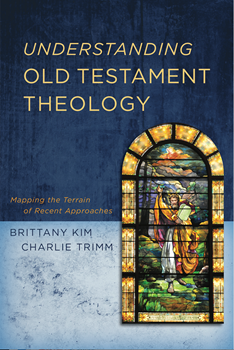Old Testament Theology
The field of Old Testament theology is vast and diverse, and shows no sign of slowing down or consolidating on a particular view. As a PhD student I felt overwhelmed by the sheer number of entries in the field and did not know how to make sense of it all. I wanted an introduction to the field of Old Testament theology that would help me navigate it all, but since one did not exist I enlisted my friend Brittany Kim and we wrote one together. The first blog post below summarizes the content of the book, while the second talks about the experiences of co-authoring a book.
Understanding Old Testament Theology (co-authored with Brittany Kim; Grand Rapids: Zondervan, 2020)
Book Announcement: Understanding Old Testament Theology (Good Book Blog)
Experiences in Co-Authoring (Good Book Blog)
As part of this project we composed two annotated bibliographies. First, we worked with Darian Lockett to create a bibliography of 101 books on biblical theology in general. Second, we created a more extensive bibliography focusing on Old Testament theology in particular.
“101 Books on Biblical Theology: An Annotated Bibliography” (co-authored with Brittany Kim and Darian Lockett)
Old Testament Theology: An Annotated Bibliography (co-authored with Brittany Kim)
The Theological Interpretation of Scripture
My first published article was an introduction to the theological interpretation of Scripture for biblical scholars.
“Evangelicals, Theology, and Biblical Interpretation: Reflections on the Theological Interpretation of Scripture” Bulletin for Biblical Research 20 (2010): 379–98
Specific Studies in Old Testament Theology
I have also undertaken several explorations in various areas connected to Old Testament theology. One early paper addressed intertextuality and preaching: how did Moses refer to the exodus in his sermons in Deuteronomy? The picture above is taken from Mount Nebo, looking over the Plains of Moab where Moses spoke to Israel in Deuteronomy. The Dead Sea is visible at the top left of the picture.
“An Early Example of Contextualization: The Exodus in Moses’ Sermons in Deuteronomy” (2012 ETS Midwest Regional)
I worked with my friend Uche Anizor, a theologian, to study how commentators have found Jesus in the books of Judges and Ruth.
“Christ in Judges and Ruth? A Survey of Recent Studies on Finding Jesus in the Old Testament” (2016 ETS Annual Meeting, with Uche Anizor)
During the pandemic of 2020 when churches were forced to go online, one question that arose was whether celebrating the Lord’s Supper could be done virtually. Uche Anizor (theology), Darian Lockett (New Testament), and myself (Old Testament) wrote a post together arguing from our disciplines that it should not be celebrated virtually. A shortened form of this post was published in the Talbot Magazine section “Best of the Blog.”
A Question I Didn’t Get Answered in Seminary: Should We Take Communion Remotely? (Good Book Blog)
The relationship between the Old Testament and the New Testament has been debated through church history and caused many Christians to downplay the Old Testament. A recent example of this is Andy Stanley’s proposal that we should unhitch ourselves from the Old Testament. This blog post addressing Stanley’s book began as a question from a student.
The (Ir)Resistible Old Testament: A Review of Andy Stanley’s “Irresistible” (Good Book Blog)
The order of books in the Old Testament appears to most Christians to be set, but early manuscripts have many different orders. In this blog post I addressed the the different positions of Ruth in the canon and looked at how the three different positions for the book of Ruth influence how we read the book.
Where is Ruth? (Good Book Blog)

